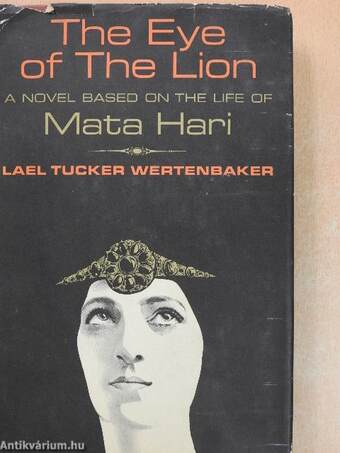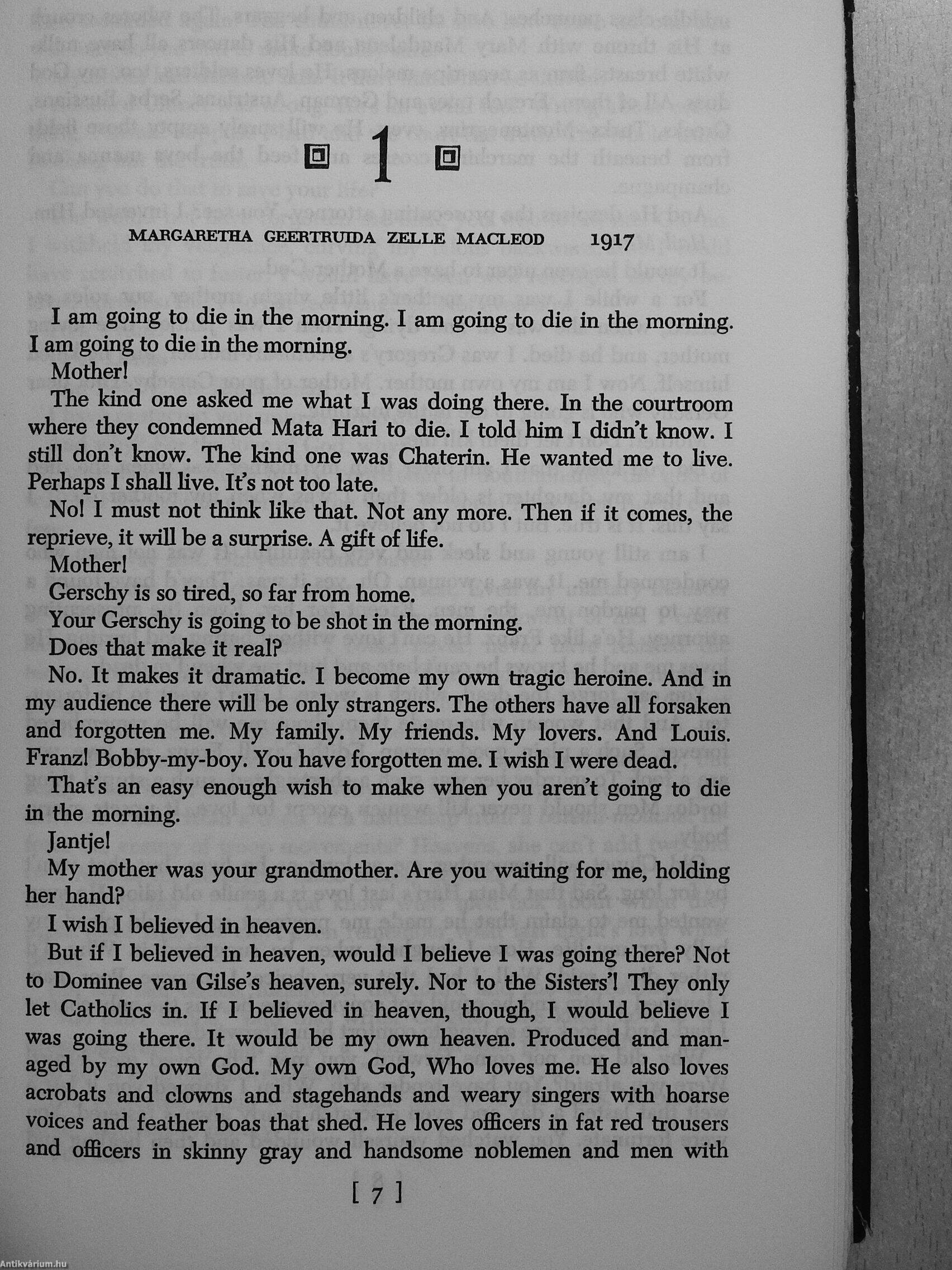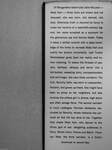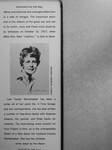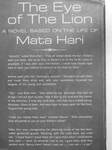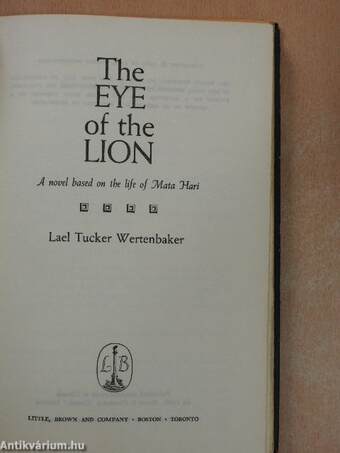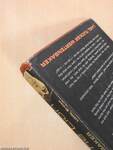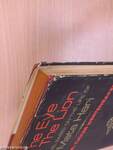1.067.317
kiadvánnyal nyújtjuk Magyarország legnagyobb antikvár könyv-kínálatát

VISSZA
A TETEJÉRE
JAVASLATOKÉszre-
vételek
The Eye of the Lion
| Kiadó: | Little, Brown and Company |
|---|---|
| Kiadás helye: | Boston-Toronto |
| Kiadás éve: | |
| Kötés típusa: | Fűzött keménykötés |
| Oldalszám: | 287 oldal |
| Sorozatcím: | |
| Kötetszám: | |
| Nyelv: | Angol |
| Méret: | 22 cm x 15 cm |
| ISBN: | |
naponta értesítjük a beérkező friss
kiadványokról
naponta értesítjük a beérkező friss
kiadványokról
Előszó
TovábbFülszöveg
7:i: tr
V ! '1 , ( ; 1 I .I'
i r '
i I
Of Margaretha Geertruida Zelle McLeod — Mata Hari — three facts are known and not disputed: she was born, she danced, she died. Otherwise truth is obsured by fancy to make her heroine of a twentieth-century legend, her name accepted as a synonym for the glamorous spy and femme fatale. Today it takes a skilled novelist with a deep knowledge of the times to recreate Mata Hari and justify her elusive immortality. Lael Tucker Wertenbaker gives back her reality and human meaning. To weave the threads of passion, betrayal, obloquy and terror into a full-bodied, sweeping story, compassionately told and tragic, she uses three narrators. The first, Gerschy Zelle, was born in Leeuwarden, Holland, and grows up there. She might have been as prosy as her neighbors, but fate involves the artless girl in drama, high doom and often savage farce. The second narrator is Louis Lasbogue, Parisian dilettante, fascinated by Gerschy, whose radiance has... Tovább
Fülszöveg
7:i: tr
V ! '1 , ( ; 1 I .I'
i r '
i I
Of Margaretha Geertruida Zelle McLeod — Mata Hari — three facts are known and not disputed: she was born, she danced, she died. Otherwise truth is obsured by fancy to make her heroine of a twentieth-century legend, her name accepted as a synonym for the glamorous spy and femme fatale. Today it takes a skilled novelist with a deep knowledge of the times to recreate Mata Hari and justify her elusive immortality. Lael Tucker Wertenbaker gives back her reality and human meaning. To weave the threads of passion, betrayal, obloquy and terror into a full-bodied, sweeping story, compassionately told and tragic, she uses three narrators. The first, Gerschy Zelle, was born in Leeuwarden, Holland, and grows up there. She might have been as prosy as her neighbors, but fate involves the artless girl in drama, high doom and often savage farce. The second narrator is Louis Lasbogue, Parisian dilettante, fascinated by Gerschy, whose radiance has survived all that life has done to her. Together they create Mata Hari, who dances to the Hindu god of war, delighting audiences in Paris, Monte Carlo, Vienna and Berlin. Franz van Weel, the third narrator, is a Dutch (Continued on second flap)
(Continued from first flap) officer and diplomat who entangles Mata Hari in a web of intrigue. The insouciant years end in the inferno of the great war and she is its victim. Louis and Franz must stand by as witnesses on October 15, 1917, when Mata Hari, their "creation," is shot at dawn.
«
Z ^
o z o
s >-
L a:
UJ
a
Lael Tucker Wertenbaker has been a writer all of her adult life. A Time foreign and war correspondent, she has also written a number of free-lance books with Suzanne Cleaves, her partner, and three books for children. The best-selling novel Lament for Four Virgins is hers, as is the unforgettable Death of a Man about her husband Charles Wertenbaker. She has two children.
Jacket design by Paul Bacon
PHINTUn UJ THS TT S »
of- "["ha i^ion :
A NOVEL BASED ON THE LIFE OF
"Secrets?" asked Mata Hari. "Tliey all talked about the war, if that's^ what you mean. But so do they at Maxim's or on the He St. Louis or anywhere. If I was after such information, I could have stayed right here or even just listened to soldiers at the Gare du Nord."
Mornet went after her, thoroughly aroused, "You went out with them and made them drink and, with your experience, loosened the tongues of the young and susceptible."
"Yes," said Mata Hari, "they talked to me. Monsieur. And told me things I did not want to hear. How it was in the mud and the horror, in the trenches, a long way from here. And they were indeed young. Monsieur. Many of them. And were soon to leave again for the front. To give their young lives . .
"Lives you helped them lose!" shouted Mornet. "With- information' they whispered to you on your traitor's pillow!"
Mata Hari rose, disregarding the detaining hands of her two fascinated gendarme guards. Standing, with her head back, she cried out, "I loved them! I loved them all! I gave them what I could before they went — back. At whatever cost to me, I gave them what they wanted most: Betray them? Never! I was not — I am not — a spy!" Vissza
Témakörök
- Idegennyelv > Idegennyelvű könyvek > Angol > Szépirodalom > Regény, novella, elbeszélés
- Szépirodalom > Regény, novella, elbeszélés > Az író származása szerint > Amerika > Amerikai Egyesült Államok
- Szépirodalom > Regény, novella, elbeszélés > Tartalom szerint > Történelmi regények > Legújabb kor > I. világháború
- Szépirodalom > Regény, novella, elbeszélés > Tartalom szerint > Életrajzi regények > Történelmi személyiségek > Külföldiek > XX. század
- Szépirodalom > Regény, novella, elbeszélés > Tartalom szerint > Kémregény
- Szépirodalom > Regény, novella, elbeszélés > Tartalom szerint > Életrajzi regények > Művészek



